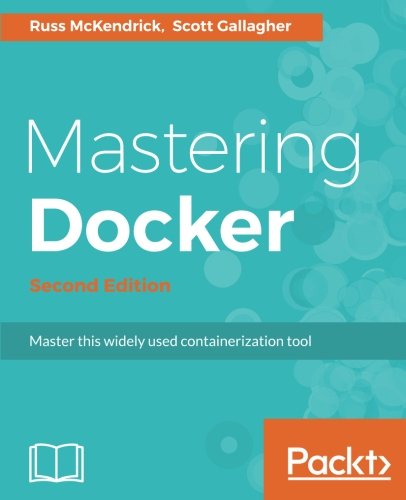; Date: Thu Apr 11 2019
Tags: Wikileaks »»»» Trump »»»» Russia »»»» Julian Assange »»»»
The USA is extraditing Julian Assange from British custody after he was arrested today on an outstanding warrant from 2012. Assange has not been charged with his alleged involvement in the conspiracy to interfere with the 2016 elections, but has curiously been charged with a single count from 2010.
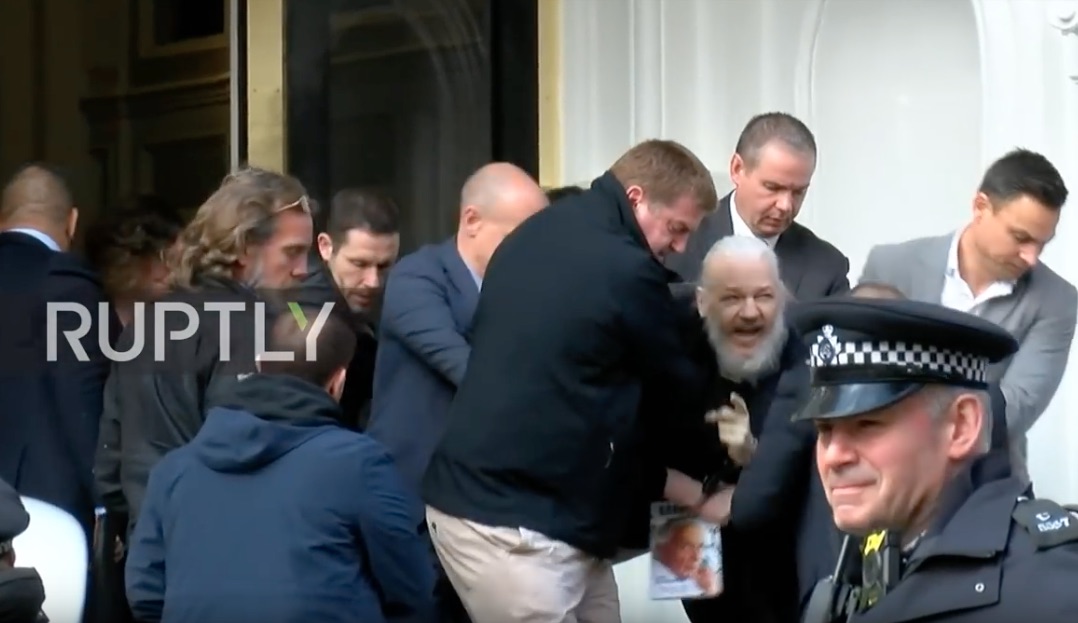
On April 11, Wikileaks founder Julian Assange was arrested by British police. So what, lots of people get arrested in London every day. What makes this arrest different is the political nature of everything surrounding the Julian Assange story. For seven years Assange has been hiding out in the Ecuadorian Embassy in London in order to evade what was seen as a politically motivated arrest and feared extradition to the USA. He had been accused of sexual assault in Sweden, but claimed that accusation was a ploy by the USA to have him enter the legal system where he could be extradited.
Todays arrest comes after months of issues being raised about his continued presence in the Ecuadorian Embassy. This was everything from strange accusations that Assange practiced bad personal hygiene, to his cat being a nuisance. But according to the current President of Ecuador that government could no longer rationalize keeping him in the Embassy given his repeated meddling in the internal affairs of other countries.
The arrest was over a British warrant from 2012 concerning Assange's failure to show up in court when summoned over the sexual assault accusation. Shortly after that warrant was issued, Assange took up residence in the Ecuadorian Embassy. That gave him some immunity from being arrested, and allowed Assange to continue working with Wikileaks.
After that arrest, Assange was arrested again under a warrant from the USA Government which was unsealed for the purpose of this arrest. This warrant contained a single count, concerning Assange conspiring with Bradly Manning (now known as Chelsea Manning) to hack into top secret USA government computers to download the documents that were ultimately posted to Wikileaks. Those documents were incident reports from Iraq and Afghanistan, as well as a huge cache of top secret State Department cables during the Hillary Clinton years at State.
What's curious about this is the thing Assange was NOT charged for. Namely assisting in leaking materials stolen from the Hillary Clinton campaign for President during the 2016 election.
During that year Wikileaks unleashed multiple dumps of emails stolen from both Democratic Party and Clinton Campaign email servers. Those email dumps became a litany that possibly served to diminish Clinton's standing and vote totals.
Assange is widely hailed as a hero over helping to expose corruption and illegal actions by Governments. Indeed we can see this arrest as a long-standing grievance by the USA Government because Wikileaks exposed top secret USA information.
Should we continue hailing Assange as a hero given his political partisan actions? It was one thing for Wikileaks to be fighting the good fight and bringing to light information which needed to be public. It is yet another thing for Assange to use Wikileaks in an effort to sway election results.
Proper journalism is not about politically partisan motivation.
The Mueller Investigation into Russia's interference with the 2016 election alleged that Wikileaks acted in a conspiracy between the Russian Government, Julian Assange, and various persons connected to the Trump Campaign. The conspiracy was perpetrated in order to sway the election towards Trump. A large part of this was outlined in an indictment of Russian Intelligence Service individuals for their role. According to the indictment the Russians were responsible for hacking into the email servers, along with many other actions such as coordinating the activity of social media accounts and fake news blogs operated by the Internet Research Agency.
Since it is alleged that Assange was involved in that conspiracy, why was he not charged with that offense? Why focus on a single offense from 2010?
The current Attorney General of the United States seems to be acting as if he is President Trump's personal lawyer, and seems to be acting to cover up the report from the Mueller Investigation. It is the Department of Justice, which he oversees, which would bring further charges against Julian Assange. If the Atty General is indeed acting to protect President Trump, why would he bring further charges against Assange? Indeed, why would he even arrest Assange given that bringing Assange to court could blow open the Russian interference into the 2016 elections conspiracy?
Resources:

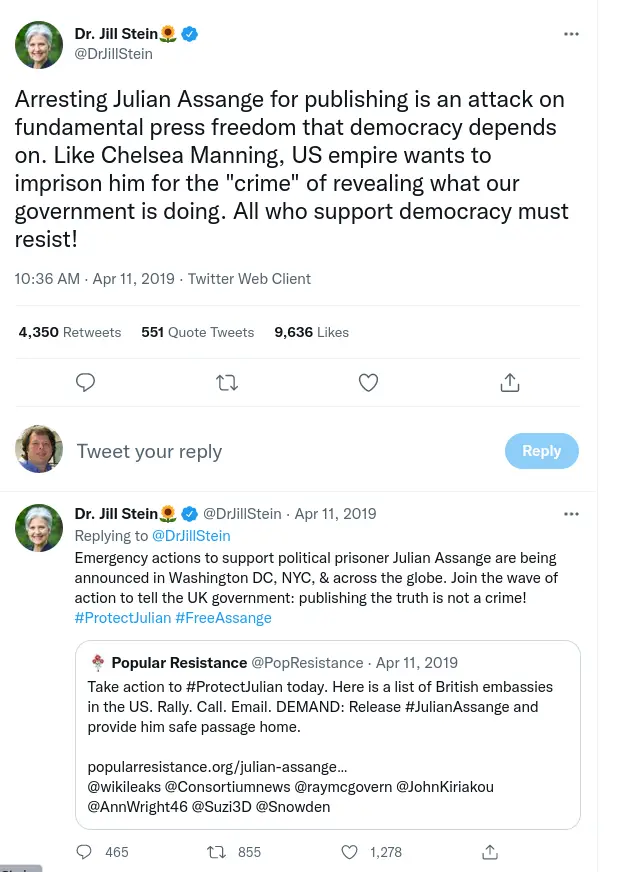
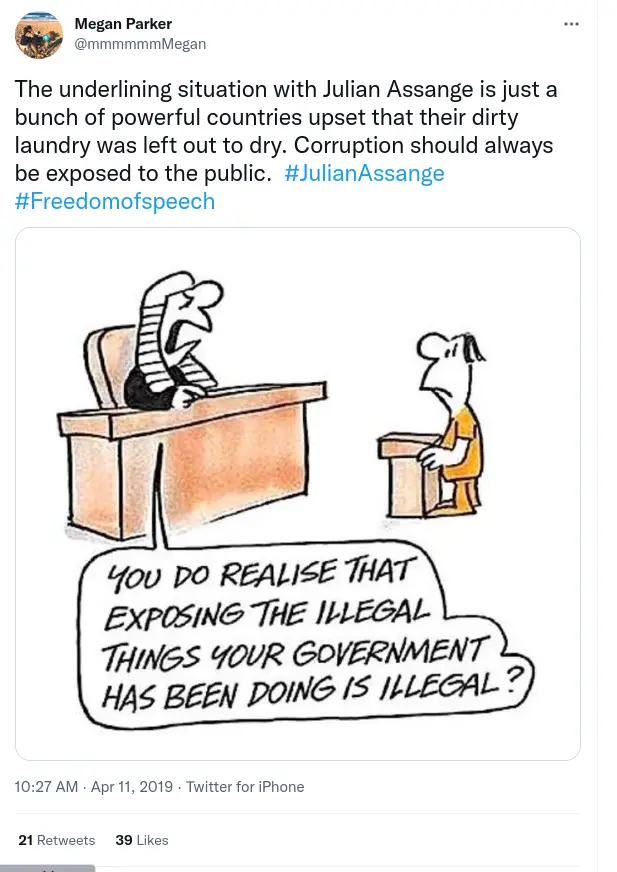
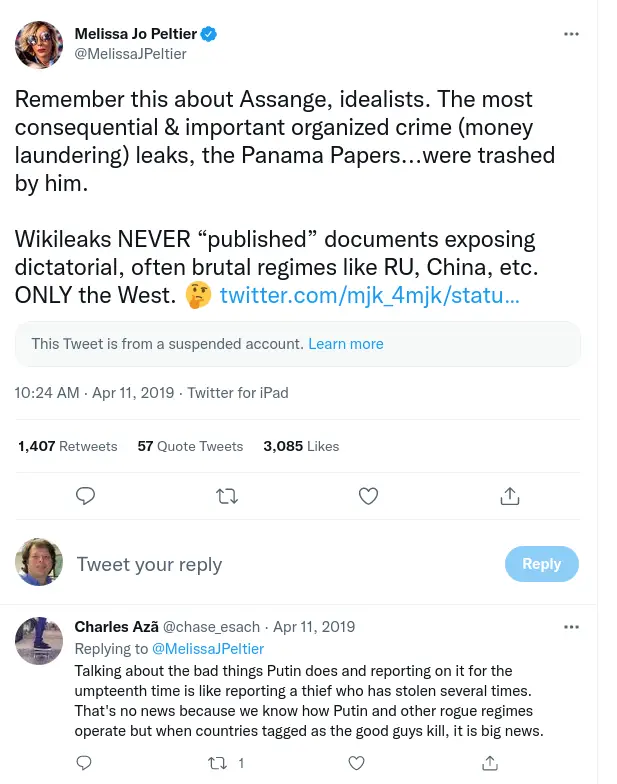
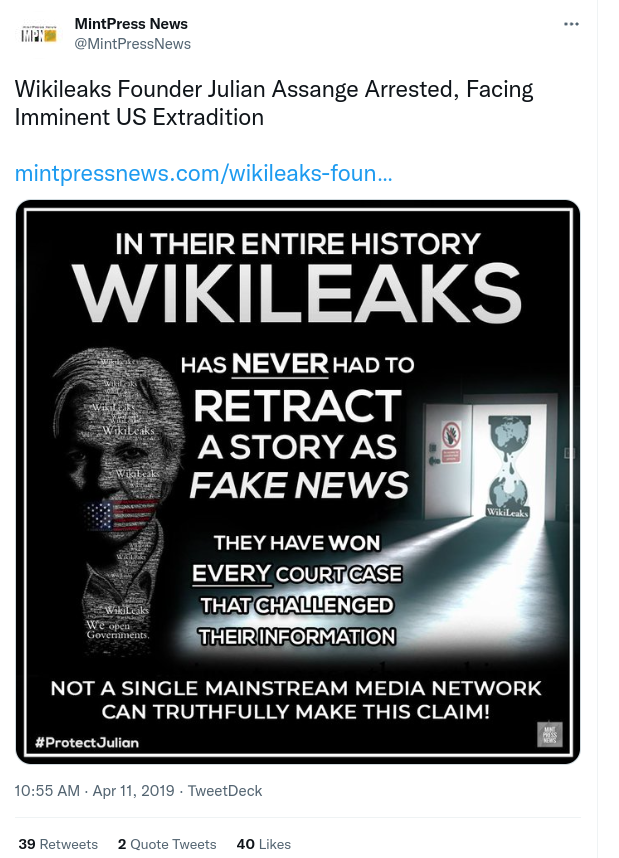
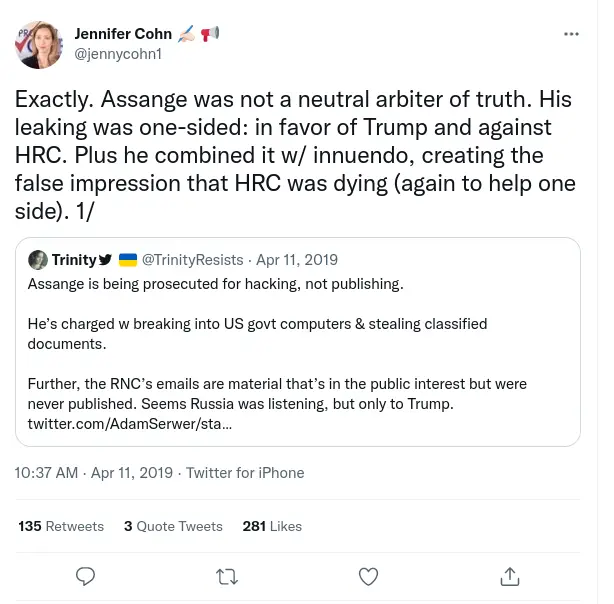
GENEVA (21 December 2018) – UN human rights experts today repeated a demand that the UK abides by its international obligations and immediately allows Wikileaks founder Julian Assange to walk free from the Ecuadorian embassy in London where he has been for over 6 years, fearing arrest by British authorities if he leaves, and extradition to the US.
“States that are based upon and promote the rule of law do not like to be confronted with their own violations of the law, that is understandable. But when they honestly admit these violations, they do honour the very spirit of the rule of law, earn enhanced respect for doing so, and set worldwide commendable examples,” the United Nations Working Group on Arbitrary Detention (WGAD) said.
In December 2015, the Working Group concluded in its
opinion No. 54/2015 that Mr. Assange – who at the time had a European arrest warrant issued against him for an allegation of crimes committed in Sweden ‑ was being arbitrarily deprived of his freedom and demanded that he be released.
“Under international law, pre-trial detention must be only imposed in limited instances. Detention during investigations must be even more limited, especially in the absence of any charge” said the experts. “The Swedish investigations have been closed for over 18 months now, and the only ground remaining for Mr. Assange’s continued deprivation of liberty is a bail violation in the UK, which is, objectively, a minor offense that cannot post facto justify the more than 6 years confinement that he has been subjected to since he sought asylum in the Embassy of Ecuador. Mr. Assange should be able to exercise his right to freedom of movement in an unhindered manner, in accordance with the human rights conventions the UK has ratified,” the experts further said
The WGAD is further concerned that the modalities of the continued arbitrary deprivation of liberty of Mr. Assange is undermining his health, and may possible endanger his life given the disproportionate amount of anxiety and stress that such prolonged deprivation of liberty entails.
“The United Kingdom has ratified the International Covenant on Civil and Political Rights (ICCPR) and has a responsibility to honour its commitment, by respecting its provisions in all cases,” the experts said.
“As the High Commissioner for human rights said several years ago, human rights treaty law is binding law, it is not discretionary law. It is not some passing fancy that a state can apply sometimes and not in the other,” the experts recalled.
“In addition, the recommendations of the WGAD Opinions are expected to be implemented by all States, including those which have not been a party in the case concerning Mr. Assange,” said the experts.
“On 10 December, the world celebrated International Human Rights Day. Seventy years ago, on that very day, the United Nations proclaimed the Universal Declaration of Human Rights, the mother of all rights contained in subsequent conventions, including the ICCPR.
“It is time that Mr. Assange, who has already paid a high price for peacefully exercising his rights to freedom of opinion, expression and information, and to promote the right to truth in the public interest, recovers his freedom,” the experts concluded.
This statement by the United Nations Working Group on
Arbitrary Detention is endorsed by the United Nations Special Rapporteur on the situation of human rights defenders, Mr. Michel Forst.
Background: Mr. Assange, a computer programmer and freedom of expression and information advocate, is the founder of Wikileaks, created to enable whistle-blowers to make public information they deem should be known in the public interest.
Mr. Assange was arrested on 7 December 2010 in the United Kingdom, pursuant to a European Arrest Warrant issued against him after he was accused of sexual misconduct in Sweden. That accusation has not been substantiated and after he was interrogated in London the Swedish Prosecutor decided in 2017 not to pursue the investigation.
Mr. Assange has been de facto arbitrarily deprived of his liberty since 2012 without charge or trial. He was first detained on remand and in isolation for 10 days in a prison in London; he then spent 550 days on bail terms constituting house arrest, pending his appeal before the UK’s Supreme Court against his extradition to Sweden. When the Supreme Court upheld the extradition decision, he sought political asylum in the Embassy of Ecuador on 16 August 2012, citing fears of being extradited from Sweden to the USA. He claimed that he had reasonable grounds to believe that should he be extradited to the USA, he would face trial for having published, through Wikileaks, thousands of US classified diplomatic cables and documents. Ecuador granted him political asylum and later Ecuadorian citizenship.
The United Kingdom has indicated that Mr. Assange’s fear to be extradited to the USA was unfounded. In April 2017, in his first public speech since becoming head of the CIA, Mr. Michael Pompeo described Wikileaks as a “hostile intelligence service” which claimed to act in the name of the defence of freedom of expression, freedom of information and privacy. The same month, the US Attorney General stated that it was a US priority to arrest and detain Julian Assange. On 15 November 2018, evidence emerged that the US Department of Justice was preparing an indictment against him but the charges have remained classified.
As a result of the Swedish Prosecutor’s decision not to pursue the investigation against Mr. Assange, the European Arrest Warrant against him was nullified. The remaining ground for arresting him is his violation of the terms of the bail in 2012, when he walked to the embassy of Ecuador to seek political asylum. The terms of bail included reporting daily to the local police station.
The UK authorities have made it clear that should he leave the Ecuadorian Embassy he would be arrested. An arrest warrant has been issued against Mr. Assange by a British court, and police have been assigned since 2012 to stand-by 24/7 at the embassy gate to arrest Mr. Assange should he exit the diplomatic premises.
- The experts: Mr. Seong-Phil Hong, Chair-Rapporteur of the
Working Group on Arbitrary Detention; Mr. Michel Forst, Special Rapporteur on the situation of human rights defenders.
Special Rapporteurs are part of what is known as the
Special Procedures of the Human Rights Council. Special Procedures, the largest body of independent experts in the UN Human Rights system, is the general name of the Council’s independent fact-finding and monitoring mechanisms that address either specific country situations or thematic issues in all parts of the world. Special Procedures’ experts work on a voluntary basis; they are not UN staff and do not receive a salary for their work. They are independent from any government or organization and serve in their individual capacity.
EFF Statement on Assange Indictment and Arrest
BY CINDY COHNAPRIL 11, 2019
While the indictment of Julian Assange centers on an alleged attempt to break a password—an attempt that was not apparently successful—it is still, at root, an attack on the publication of leaked material and the most recent act in an almost decade-long effort to punish a whistleblower and the publisher of her leaked material. Several parts of the indictment describe very common journalistic behavior, like using cloud storage or knowingly receiving classified information or redacting identifying information about a source. Other parts make common free software tools like Linux and Jabber seem suspect. And while we are relieved that the government has not chosen to include publication-based charges today, if Assange is indeed extradited, the government can issue superseding indictments. It should not do so. Leaks are a vital part of the free flow of information that is essential to our democracy. Reporting on leaked materials, including reporting on classified information, is an essential role of American journalism.
Arrest update - SW1 Apr 11, 2019 10:33 BST
Julian Assange, 47, (03.07.71) has today, Thursday 11 April, been arrested by officers from the Metropolitan Police Service (MPS) at the Embassy of Ecuador, Hans Crescent, SW1 on a warrant issued by Westminster Magistrates' Court on 29 June 2012, for failing to surrender to the court.
He has been taken into custody at a central London police station where he will remain, before being presented before Westminster Magistrates' Court as soon as is possible.
The MPS had a duty to execute the warrant, on behalf of Westminster Magistrates' Court, and was invited into the embassy by the Ambassador, following the Ecuadorian government's withdrawal of asylum.
UPDATE: Arrest of Julian Assange Apr 11, 2019 12:31 BST
UPDATE: Julian Assange arrest.
Julian Assange, 47, (03.07.71) has today, Thursday 11 April, been further arrested on behalf of the United States authorities, at 10:53hrs after his arrival at a central London police station. This is an extradition warrant under Section 73 of the Extradition Act. He will appear in custody at Westminster Magistrates' Court later today (Thursday, 11 April).
US Department of Justice, Eastern District of Virginia
FOR IMMEDIATE RELEASE Thursday, April 11, 2019
WikiLeaks Founder Charged in Computer Hacking Conspiracy
ALEXANDRIA, Va. – Julian P. Assange, 47, the founder of WikiLeaks, was arrested today in the United Kingdom pursuant to the U.S./UK Extradition Treaty, in connection with a federal charge of conspiracy to commit computer intrusion for agreeing to break a password to a classified U.S. government computer.
According to court documents unsealed today, the charge relates to Assange’s alleged role in one of the largest compromises of classified information in the history of the United States.
The indictment alleges that in March 2010, Assange engaged in a conspiracy with Chelsea Manning, a former intelligence analyst in the U.S. Army, to assist Manning in cracking a password stored on U.S. Department of Defense computers connected to the Secret Internet Protocol Network (SIPRNet), a U.S. government network used for classified documents and communications. Manning, who had access to the computers in connection with her duties as an intelligence analyst, was using the computers to download classified records to transmit to WikiLeaks. Cracking the password would have allowed Manning to log on to the computers under a username that did not belong to her. Such a deceptive measure would have made it more difficult for investigators to determine the source of the illegal disclosures.
During the conspiracy, Manning and Assange engaged in real-time discussions regarding Manning’s transmission of classified records to Assange. The discussions also reflect Assange actively encouraging Manning to provide more information. During an exchange, Manning told Assange that “after this upload, that’s all I really have got left.” To which Assange replied, “curious eyes never run dry in my experience.”
Assange is charged with conspiracy to commit computer intrusion and is presumed innocent unless and until proven guilty beyond a reasonable doubt. If convicted, he faces a maximum penalty of five years in prison. Actual sentences for federal crimes are typically less than the maximum penalties. A federal district court judge will determine any sentence after taking into account the U.S. Sentencing Guidelines and other statutory factors.
G. Zachary Terwilliger, U.S. Attorney for the Eastern District of Virginia, John C. Demers, Assistant Attorney General for National Security, and Nancy McNamara, Assistant Director in Charge of the FBI’s Washington Field Office, made the announcement after the charges were unsealed. First Assistant U.S. Attorney Tracy Doherty-McCormick, Assistant U.S. Attorneys Kellen S. Dwyer, Thomas W. Traxler and Gordon D. Kromberg, and Trial Attorneys Matthew R. Walczewski and Nicholas O. Hunter of the Justice Department’s National Security Division are prosecuting the case.
The extradition will be handled by the Department of Justice’s Office of International Affairs.
A copy of this press release is located on the website of the U.S. Attorney’s Office for the Eastern District of Virginia. Related court documents and information are located on the website of the District Court for the Eastern District of Virginia or on PACER by searching for Case No. 1:18-cr-111.
An indictment contains allegations that a defendant has committed a crime. Every defendant is presumed to be innocent until and unless proven guilty in court.



